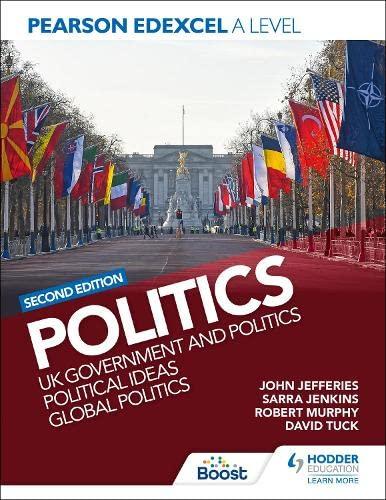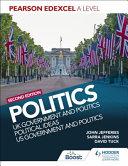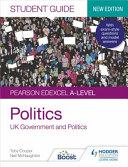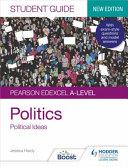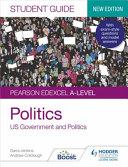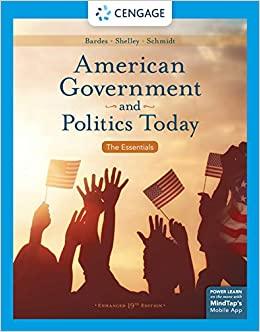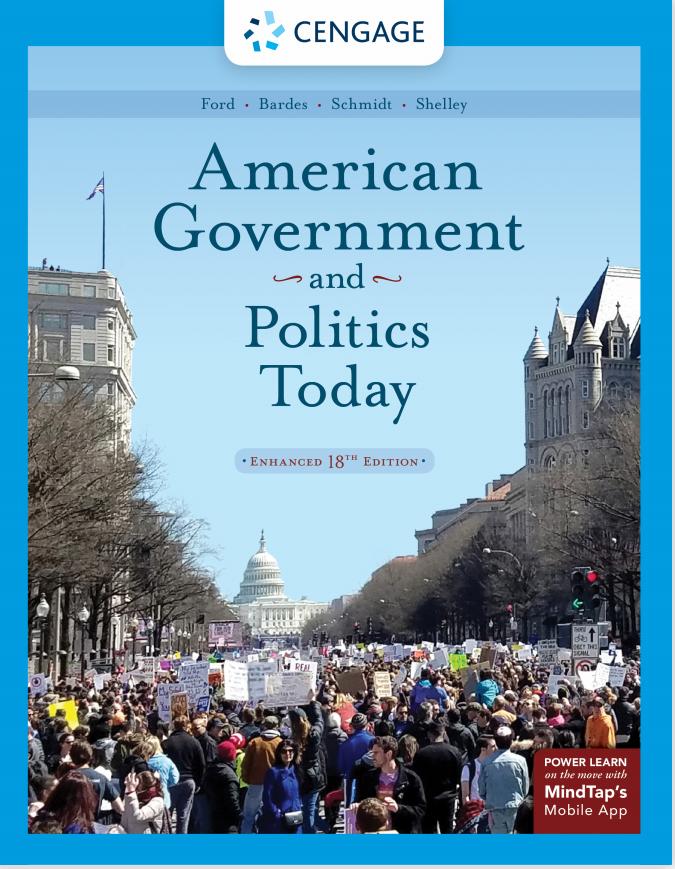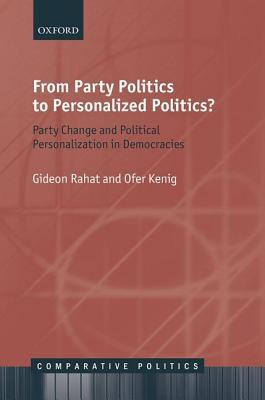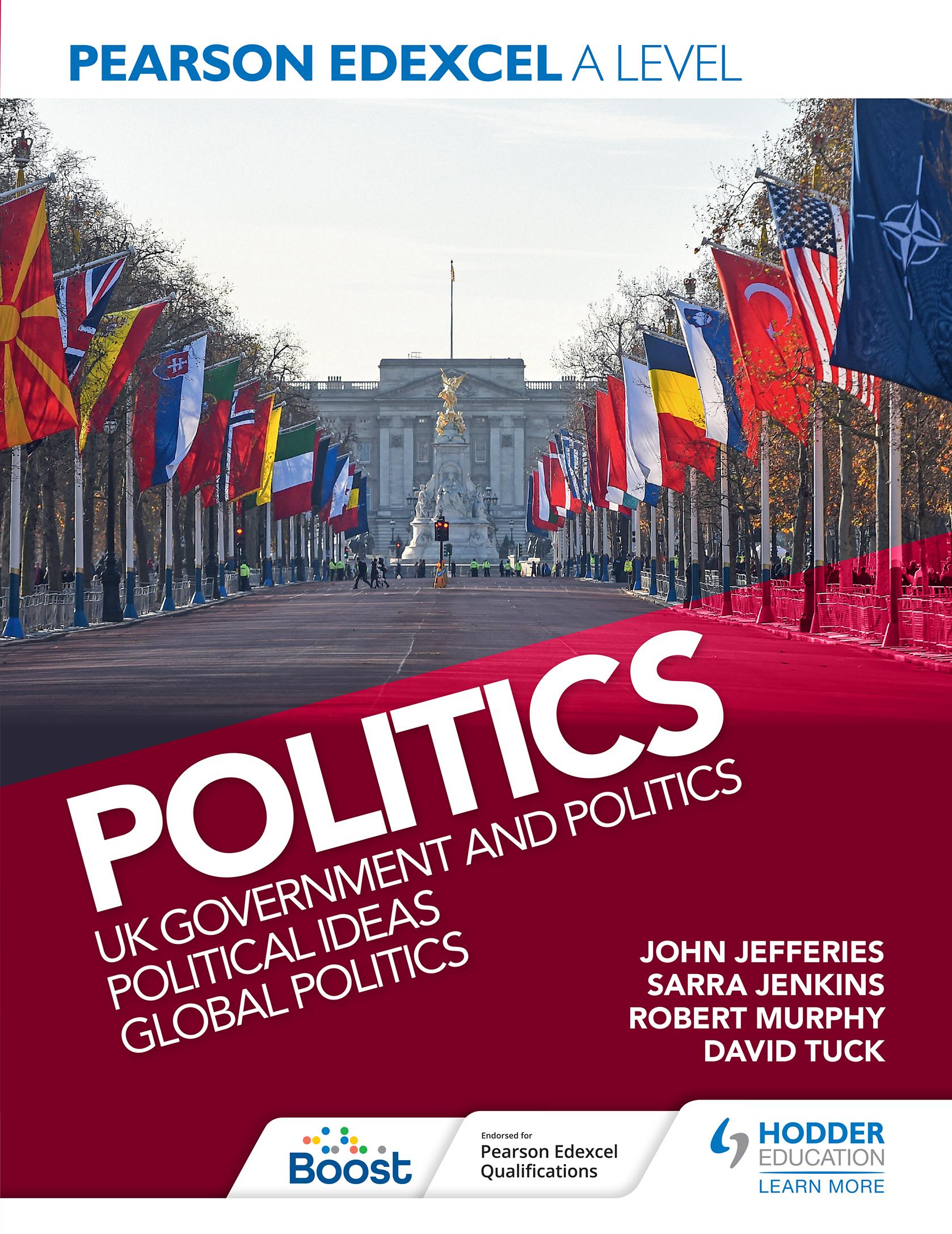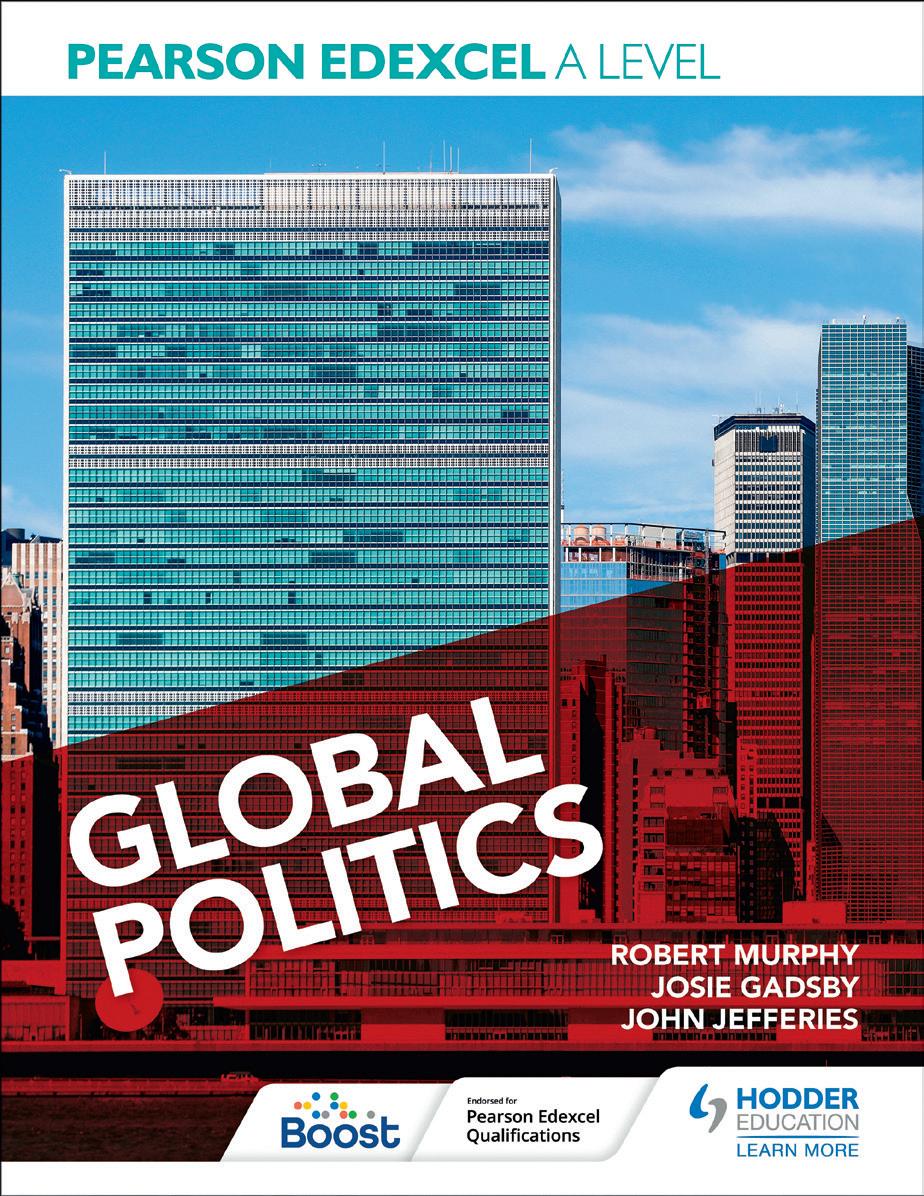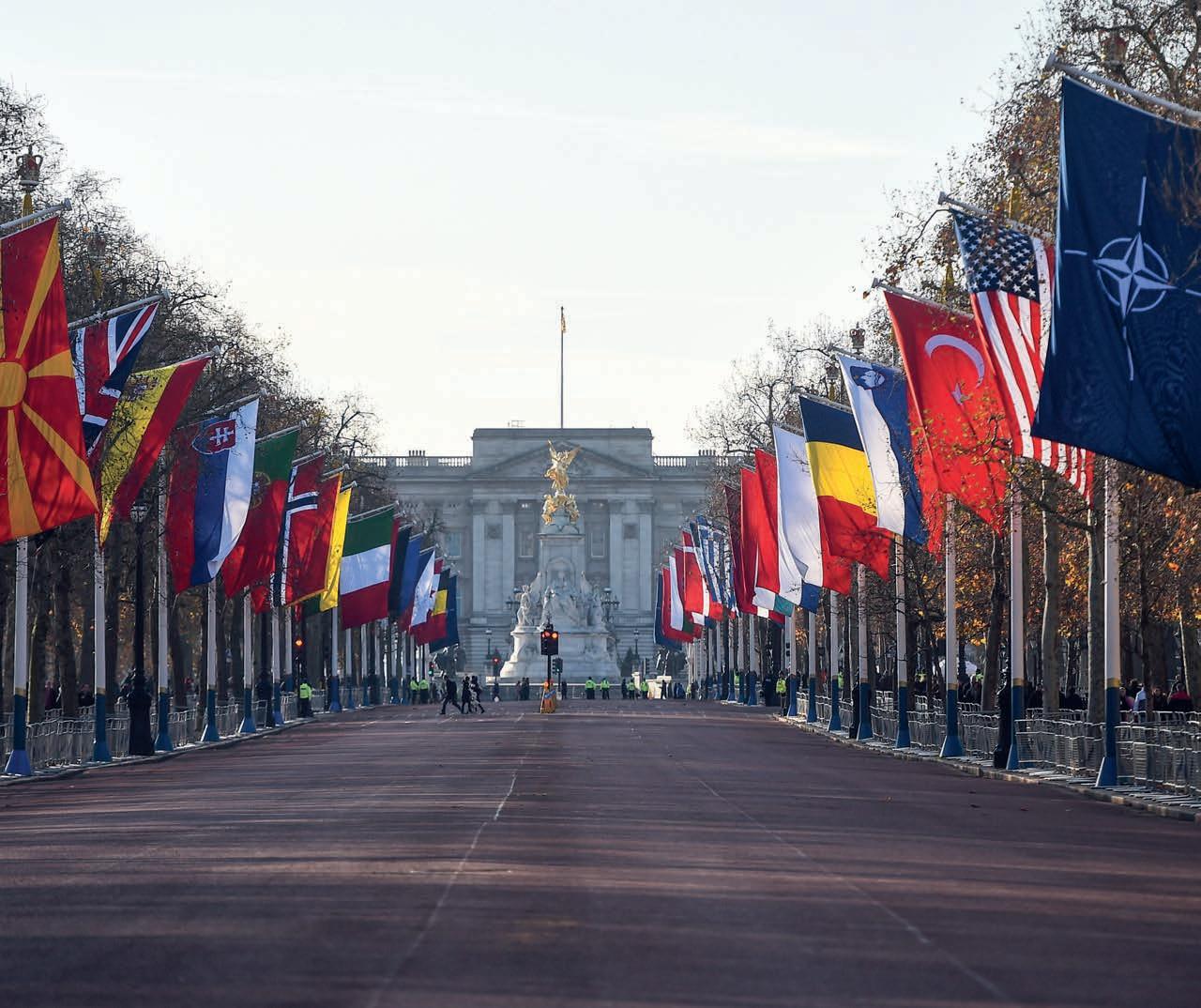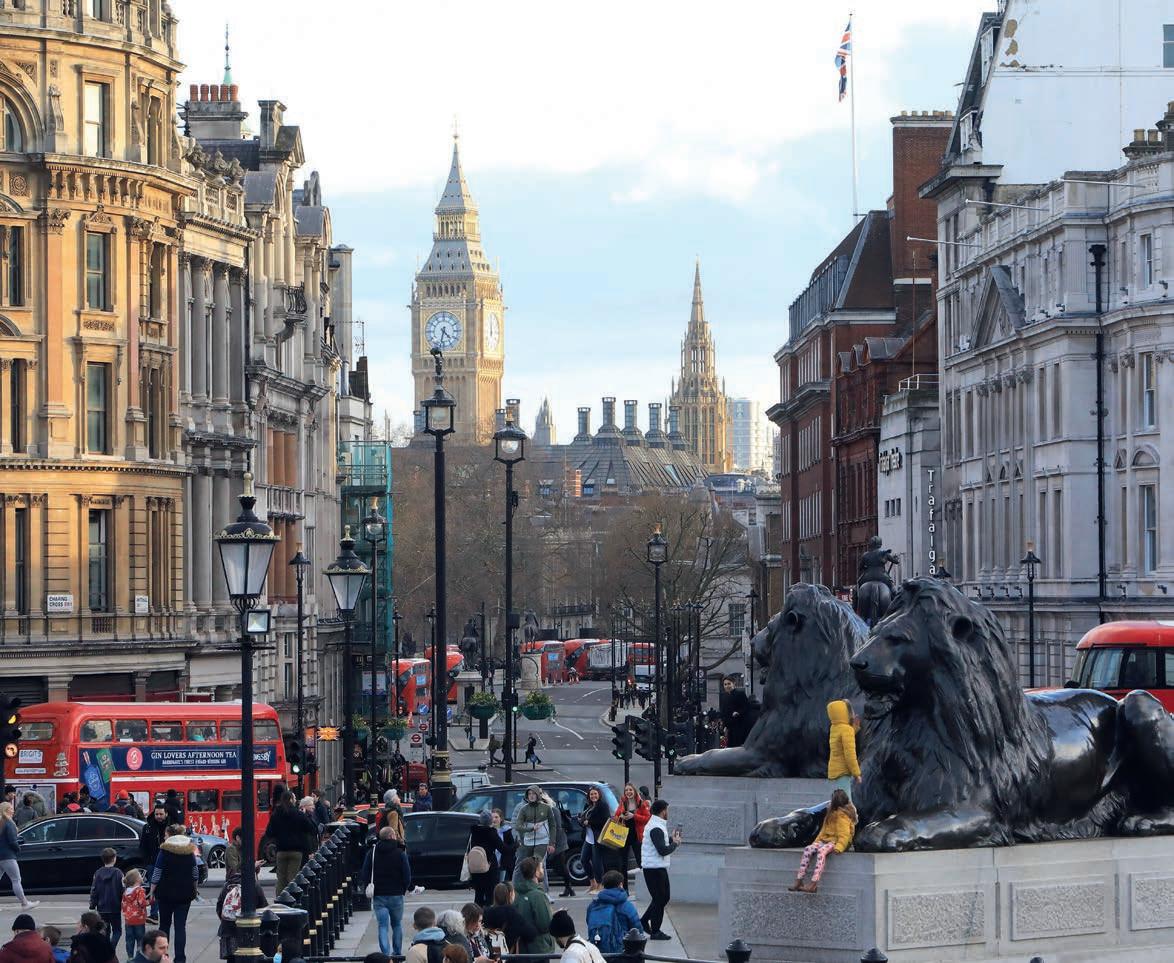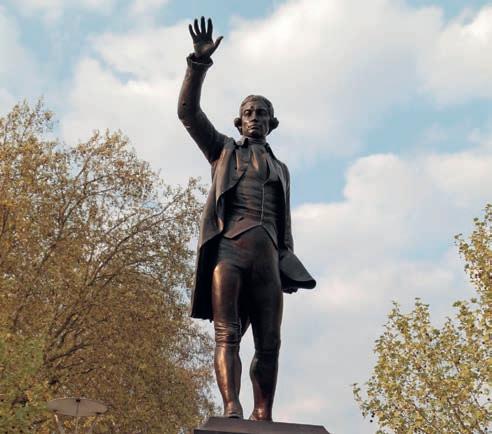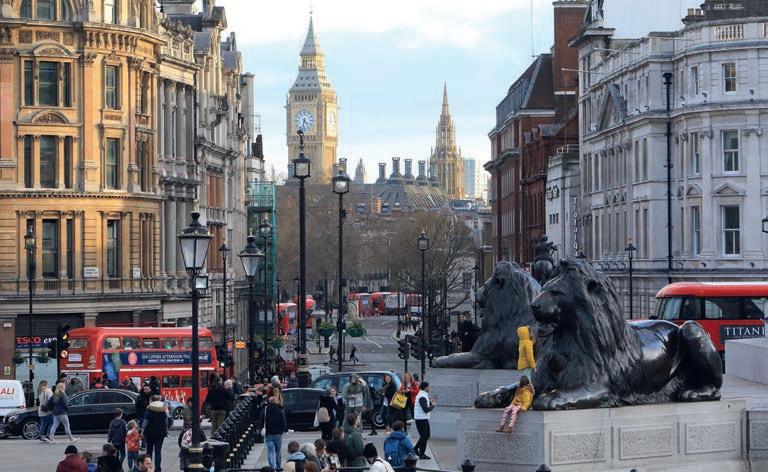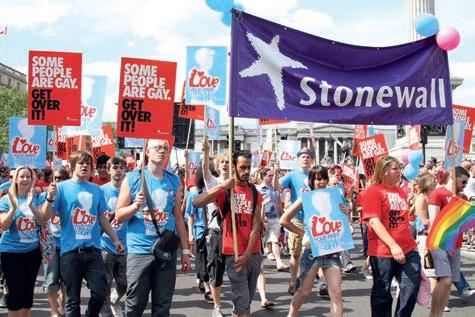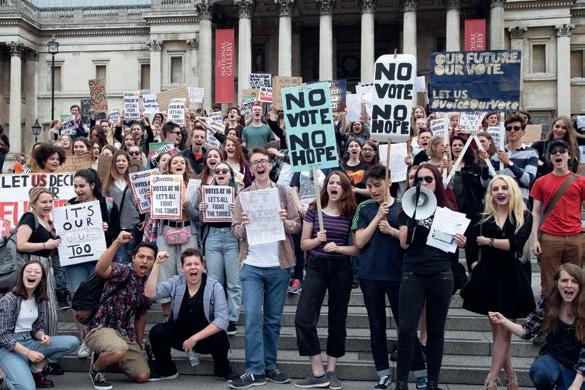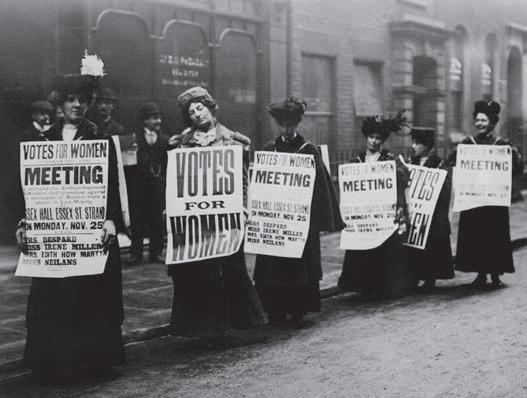Current systems of democracy in the UK
Here we look at two forms of democracy in the UK — representative democracy and direct democracy.
Representative democracy
The UK is a representative democracy, which means that the voters elect politicians to make decisions on their behalf. There are many complicated political decisions that need to be made in a modern democracy, and the public do not have the time and understanding to vote on all of them. It is the job of professional politicians to acquire this sort of political understanding so that they can make informed decisions in the interests of the whole nation.
In a representative democracy, elected politicians are made accountable to the electorate in regular elections. This means that the voters retain sovereignty because they decide whether or not to renew the mandate of their representatives.
Representative democracy is based on the principle that elected politicians should represent the interests of all their constituents. As a result, Members of Parliament (MPs) spend a significant amount of time in their constituencies listening to the concerns of the people in public meetings and surgeries. However, an elected
Key term
Representative democracy A form of democracy in which voters elect representatives to make political decisions on their behalf. These representatives are then held accountable to the public in regular elections.
Children celebrate Queen Elizabeth II’s Platinum Jubilee at a street party in Kingston-upon-Thames
politician should not be a delegate simply carrying out the will of others. Instead, when making decisions, they should weigh up the feelings of the people they represent with their party’s manifesto and their wider understanding of an issue. In other words, representatives should act according to their best judgement rather than only following the voters’ wishes.
The Westminster Parliament contains 650 MPs, all of whom are accountable to their constituents in regular general elections. Scotland, Wales and Northern Ireland also have their own devolved governments that legislate on most of their domestic affairs, while elected mayors and local councils provide another layer of representation for the public.
Advantages of representative democracy
The main advantage of representative democracy is that government is carried out by professional politicians who are required to be well informed about political issues. They are more likely to make politically educated decisions than most members of the public, who may be swayed by emotion and may not fully understand the complexities of a question. For example, before a parliamentary bill is enacted, it will have been drawn up by ministers and civil servants, been debated in both the House of Commons and the House of Lords, and been further analysed in committee stage when amendments may be added to it.
In a representative democracy, elected politicians balance conflicting interests when reaching decisions. This is important in protecting the rights of all citizens, especially minorities, and ensuring that the implications of a decision for all members of the community have been thoroughly examined. Over controversial issues, parliament balances the benefits to the majority with the more negative impact on the minority; this sort of balancing is one of the key elements of a representative democracy.
In focus
The representative function of an MP
In his speech to the electors of Bristol in 1774, Edmund Burke (1729–97) explained, ‘Your representative owes you, not his industry only, but his judgement and he betrays instead of serving you if he sacrifices it to your opinion.’ Given that Burke was a known opponent of slavery, and the wealth of Bristol’s merchant class was founded on the slave trade, this was a courageous statement that, if elected, Burke would act according to his conscience rather than do what his electors would like him to do. His support of the American revolutionaries similarly put him at odds with most of his constituents. His justification of his right to choose his own position is often used to underpin the principles on which representative democracy is based.
A statue to Edmund Burke in Bristol. He served as MP for the city from 1774 to 1780
A representative democracy also comprises the principle of accountability, which means that in regular elections the voters can decide whether to renew the mandate of their representatives. In other words, if the public do not approve of the policies or performance of a government, they can elect another one.
Disadvantages of representative democracy
Critics of representative democracy, as it operates in the UK, argue that MPs represent a metropolitan elite that does not represent the more traditional values of the population. This can mean that MPs can be disengaged from the public and so do not adequately represent their interests. For example, in the 2016 EU membership referendum 52% of the public voted to leave the European Union, whereas 74% of MPs had been in favour of remaining.
Powerful pressure groups, lobbyists and the London-based media also establish a self-perpetuating Westminster ‘bubble’, which disconnects representatives from the issues that are important to their constituents.
In focus
According to the Russian anarchist thinker Mikhail Bakunin (1814–76), representative democracy is a sham since it seeks to falsely legitimise the rule of the ‘intellectual governing minority, who, while claiming to represent the people, unfailingly exploits them’. The anarchist political activist Emma Goldman (1869–1940) is also reputed to have said, ‘If voting changed anything they’d make it illegal.’ In 2014, the comedian and activist Russell Brand echoed these arguments at the Cambridge Union when he stated that UK parliamentary democracy is ‘designed to sustain the current power structure. . .be under no illusions. . .that is its primary objective’.
MPs can have outside interests, including second jobs (so long as they declare them), which can further contribute to a conflict of interests and possibly compromise their ability to fully represent their constituents. In 2021, Owen Paterson resigned as an MP after he was criticised by the Commissioner for Parliamentary Standards for lobbying on behalf of companies that employed him. The same year Sir Geoffrey Cox MP, the former Attorney General, was also criticised for earning £900,000 for legal work he undertook in addition to his MP’s salary. Although no conflict of interest was found, some suggested that this was an excessive amount to earn when his primary job was to represent his constituents.
Critics also claim that the Westminster Parliament is highly unrepresentative because it is elected through first-past-the-post (FPTP). As a result the Conservative and Labour parties dominate the House of Commons at the expense of smaller parties such as the Liberal Democrats, Greens and the UKIP/Brexit party, which have struggled to gain appropriate representation even when they have polled highly.
The House of Lords is unelected and so unaccountable to the public, further undermining Parliament’s representative function. The social make-up of Parliament is still primarily white, male and middle class.
How unrepresentative is the Westminster Parliament?
A popular criticism of the Westminster Parliament is that it is socially exclusive and therefore unrepresentative of the interests of contemporary society. Although
Key term
Lobbyist Represents the interests of a particular group or cause and seeks to influence politicians in its favour.
Knowledge check
1 Define democracy.
2 What is representative democracy?
3 Ac cording to Edmund Burke, what is the role of an MP?
4 How many MPs are there in the Westminster Parliament?
Knowledge check
5 What is the electoral system used to elect the Westminster Parliament?
6 List three advantages of UK representative democracy.
7 List three criticisms of UK representative democracy.
the 2019 general election did elect the most diverse House of Commons ever, as Table 1.1 illustrates, men and those educated in private schools are still substantially over-represented in Westminster.
The social background of MPs is much more middle class than it was in the parliament elected in 1945. Eighty-five per cent of MPs also attended university and 19% graduated from either Oxford or Cambridge. Some argue that MPs do not need to share the same characteristics as a group to represent their interests. For example, legislation advancing LGBTQ+ rights has been passed by predominantly heterosexual parliaments.
A powerful criticism of UK representative democracy is that it is least likely to engage the poorest and most marginalised in society. In 2018, the Hansard Society estimated that 83% of higher (A/B) social groups were prepared to participate in politics, compared with 41% for less prosperous (D/E) social groups. Only 2% of homeless people were registered to vote in 2018.
Direct democracy in the UK
Key term
Direct democracy A form of democracy in which citizens themselves, rather than their representatives, make political decisions. The most significant modern example of direct democracy is a referendum.
Direct democracy is a form of democracy in which decisions are directly made by the public without their opinions being channelled through representatives. In a direct democracy there is no distinction between government and citizen. Instead, there is continuous engagement by the public in the democratic process. With over 40 million voters in the UK, it would be impossible for it to be completely governed according to the principles of direct democracy. However, elements of direct democracy have been introduced into the UK’s system of representative democracy to engage the public more closely in issues that directly concern them.
Table 1.1 The 2019 Parliament
(2019)
As Table 1.2 illustrates, there are several different sorts of direct democracy used in the UK. Referendums are the most important because of the far-reaching consequences they can have.
Table 1.2 Types of direct democracy
Example Why and when have they been used? Advantages and disadvantages
Referendums Referendums enable the public to directly express their views on single issues. In 2014, in the Scottish independence referendum, 55.3% voted in favour of Scotland remaining in the UK and 44.7% voted in favour of independence. In the EU referendum in 2016, 52% voted in favour of leaving the EU and 48% voted in favour of remaining
Electronic petitions
If a petition on the government website reaches 100,000 signatures it will be considered for debate either in Westminster Hall or the chamber of the House of Commons. This does not mean that legislation will have to be forthcoming. However, it does mean that Parliament has to engage with issues the public feel strongly about. In 2021 several important issues were raised by e-petitions such as making it a legal requirement for night clubs to search guests on entry
Providing the public with a direct choice can help to settle controversial issues. Since the public have voted directly, the result can claim greater legitimacy than a decision reached by their representatives. However, critics note that referendums require a detailed understanding of issues, which the public may lack. The ongoing debate over Scottish independence and the UK’s relationship with the EU also suggests that referendums do not conclusively resolve contentious issues
In 2020, England footballer Marcus Rashford’s #EndChildFoodPoverty gained over 1.1 million signatures, generating huge public enthusiasm and persuading the government to commit to free school meals for low-income families during school holidays However, e-petitions can also raise false expectations and consume parliamentary time. There are issues on which Parliament cannot legislate (an e-petition to revoke Sir Tony Blair’s knighthood gained more than 1 million signatures but was rejected because knighthoods are bestowed by the monarch) or will not legislate (a petition demanding Article 50 be revoked so that the UK would remain in the EU gained 6.1 million signatures in 2019). The publicity e-petitions generate is nonetheless important in informing and progressing public debate
Consultative exercises
These can be set up when governing bodies want to assess the likely reaction to their proposed policies. Communities that will be affected have been consulted over the expansion of Heathrow and the HS2 rail link
Open primaries In open primaries, the public directly decide who the candidate should be. David Cameron encouraged open primaries to open up politics. Thirteen Conservative candidates were selected in this way for the 2015 general election. However, for the 2019 general election the Conservatives selected only one of their candidates through an open primary
These provide an important way of engaging with the public on issues that directly affect them. However, since they are consultative exercises, the public’s opinion is not binding. Critics further claim that the most socially disadvantaged groups are least likely to engage, making consultative exercises unrepresentative
If the public have direct influence over who the candidates for political office will be, people less closely affiliated with political parties are more likely to enter politics. Whether or not this is a positive development divides opinion. Sarah Wollaston was the first Conservative parliamentary candidate to be selected in this way in 2009. As a Conservative MP she proved very independent-minded and eventually abandoned the party to join the Liberal Democrats
Example Why and when have they been used?
Election of the leadership of political parties
Recall of MPs Act 2015
All the main political parties now allow their members to decide who the leader of their party will be. This is a significant power since it may determine who the prime minister will be.
In 2022, Liz Truss defeated Rishi Sunak for the leadership of the Conservative Party by 57% to 43%. In 2020, Sir Keir Starmer was elected leader of the Labour Party with 56% of the vote of party members
Advantages and disadvantages
Supporters argue that this makes the leadership accountable to the whole party. This is an especially powerful argument in the Labour Party, which sees itself both as a political party and as a popular movement. Critics claim it gives too much influence to party activists, who are generally more radical than the electorate. For example, Labour Party members re-elected Jeremy Corbyn as leader in 2016 by 61.8% even though Labour MPs had previously passed a vote of no confidence in him by a staggering 172/40 votes. Although Liz Truss’ policies proved very popular with Conservative Party members they were hugely divisive among Conservative MPs, leading to political chaos and her resignation after only 45 days in office
If an MP has been imprisoned, suspended from the House by the Committee on Standards or convicted of making false expenses claims then a recall petition signed by a minimum of 10% of their constituents can trigger a by-election.
In 2019 the Peterborough MP Fiona Onasanya was sentenced to a three-month jail term for perverting the course of justice. 25% of registered voters demanded her recall and she did not contest the subsequent by-election.
In 2019 Chris Davies was convicted of making fraudulent expenses claims. 19% of the registered electors of Brecon and Radnorshire signed a recall petition. Davies contested the subsequent by-election, which he lost
Advantages of direct democracy
Power of recall makes MPs accountable to their constituents in matters of serious misconduct or illegal behaviour. However, the circumstances in which it can be activated are so extreme that critics argue its impact has been negligible
Supporters of direct democracy argue that it engages the public and makes politicians more responsive to what people really think. This creates a closer connection between the public and political decision making.
By providing the public with more opportunities to make decisions it creates greater engagement in the political process, encouraging a more politically educated and civically involved citizenry.
A greater use of direct democracy ensures that our representatives are kept better informed of developing public attitudes through referendums, consultative exercises and electronic petitions.
Disadvantages of direct democracy
Critics of direct democracy respond that referendums dangerously simplify questions to a binary ‘yes/no’ when the issues are much more complex than that. For example, the UK’s departure from the EU raised highly complicated issues such as the UK’s relationship with the EU customs union and the EU single market, and the border status of Northern Ireland. None of these issues was addressed in the 2016 referendum, which posed only this question: ‘Should the United Kingdom remain a member of the European Union or leave the European Union?’
A direct democracy can challenge the Burkean principle that representatives should act according to their conscience, not the wishes of their constituents. A high-profile example of this is Theresa May, who supported Remain in the 2016 referendum but went on to lead a government committed to withdrawing from the EU.
Direct democracy does not balance conflicting interests or protect the rights of minorities. This is why Clement Attlee referred to referendums as ‘a device of demagogues and dictators’.
Direct democracy can also encourage the public to vote on issues on which they are not sufficiently knowledgeable to make well-informed decisions.
Is the UK suffering from a participation crisis?
It has been suggested that a general failure to engage in politics means that the public are so content with politics that they see no pressing need to engage. This is an extremely dangerous argument because it suggests that politicians should aspire to complete public disengagement from politics, which would be the end of participatory democracy.
Public trust in MPs
When Neil Kinnock became an MP, his father told him, ‘Remember, Neil, MP stands not just for Member of Parliament but also for Man of Principle.’ Unfortunately, over the years a number of MPs have not lived up to these high standards. In 2009, MPs collectively were held up to contempt and ridicule over allegations that they were overclaiming on their expenses. A perennial criticism is that MPs can exploit their public position for private gain. In 2010, a former Labour minister, Stephen Byers, was secretly filmed telling a consultancy firm that he was like ‘a cab for hire’. In 2021, Conservative minister Owen Paterson resigned as an MP after the House of Commons Standards Committee suspended him for 30 days for ‘an egregious case of paid advocacy’. Media interest in such stories has done much to damage the credibility of Westminster and fuel voter disengagement. In 2021, according to a YouGov poll, 80% of those surveyed believed there was a fair or significant amount of corruption in UK politics, with just 1% saying there was no corruption.
Voting is one of the most obvious and important ways of engaging in politics. Between 1964 and 1997 the average turnout in general elections was 74.5%.
l Voter turnout dramatically decreased to just 59.4% in 2001 when the Blair government seemed almost certain of being re-elected given its strong record on governing competence and William Hague’s uninspiring leadership of the Conservative Party.
l In the next four general elections more pressing issues were at stake and so voting steadily increased, reaching a high point of 68.7% in 2017.
l However, the average turnout in general elections from 2005 to 2019 was 65.7%, which was 8.8% less than from 1964 to 1997. This suggests a concerning downward trend.
Significantly, political engagement is least likely from the most socially disadvantaged. For example, in the 2019 general election, 68% of A/B voters voted, but only 53% of D/E voters. Three of the five constituencies with the lowest turnout in that election were in Kingston upon Hull, where 45% of neighbourhoods are among the most deprived 10% in England. This suggests a crisis of engagement among the most marginalised social groupings.
From Table 1.3 it is clear that the numbers voting in general elections are, on average, significantly lower than they have been.
Historically, the turnout in national elections in the UK has been considerably higher than that in US presidential elections. However, in the 2020 US presidential election the turnout was 67%, which was equivalent to the UK general election in 2019. Voter turnout in recent UK general elections has also been noticeably lower than in several other European democracies where voting is not compulsory and yet turnout is consistently high. This suggests that UK politicians should not be complacent about voter participation (Table 1.4).
Devolved governments, elected mayors and elected crime and police commissioners provide the public with greater opportunities to engage with the political process at a regional or local level. However, recent voter turnout at such elections indicates that the problem of voter engagement is not confined to Westminster. For example, turnout in elections for the devolved parliaments is no higher than for the Westminster Parliament and in the case of the Welsh Parliament (Senedd Cymru) is significantly lower (Table 1.5).
Table 1.4 Turnout in selected national elections
Table 1.3 The turnout in British general elections, 1964–2019
Although there has been a slight increase in voter turnout for elected mayors, they have not succeeded in generating significant enthusiasm from the electorate (Table 1.6). Police and crime commissioners were elected in 2021 with, on average, a turnout of just 33.2%, although that was considerably higher than the 15.1% turnout in 2012 when they were introduced.
The membership of political parties (Table 1.7) is also significantly lower than it was in the 1950s. In 1953, for example, the membership of the Conservative Party was 2,806,000 and the Labour Party 1,005,000. This does not necessarily indicate a participation crisis, since voters are less likely to fully identify with one party because of partisan dealignment and therefore have less motivation to join one.
Table 1.7 The membership of political parties in the UK, 2021
However, other evidence suggests claims of a participation crisis are exaggerated. When issues are sufficiently important to the public they can still vote in very large numbers. The Scottish independence referendum in 2014 recorded an 84.6% turnout. There was also an increase of 7.6% in voting from the first to the second referendums on the UK’s membership of the EEC/EU (Table 1.8).
The public may also be choosing to participate in politics in different ways. Parliamentary e-petitions can generate huge support, as evidenced by the 6.1 million people who signed the Revoke Article 50 and Remain in the EU petition in 2019. Given that voters are increasingly disengaged from traditional party politics, e-petitions provide a fresh way of public participation. For example, in 2021, Parliament debated a variety of e-petitions ranging from the protection of hedgehogs to revoking the television licence.
The hundreds of thousands who marched in London in 2019 to demand that the UK remain in the EU, and the 100,000 who joined protests in Glasgow during the COP26 climate change conference in November 2021, further demonstrate the strength of political activism. Black Lives Matter has stimulated a powerful debate about racism in the UK, highlighting how social movements can encourage intense political dialogue, especially among young people.
Key term
Participation crisis
A point at which the public have become disengaged from politics and voting levels have fallen so low that the legitimacy of elected governments can be questioned.
Table 1.8 Turnout in the 1975 and 2016 EEC/EU referendums
Knowledge check
11 Define participation crisis.
12 What groups are least likely to vote in UK elections?
13 What was the turnout in the two most recent UK general elections?
Table 1.5 Turnout in Scottish and Welsh Parliament elections
Cymru)
Table 1.6 Turnout in mayoral elections
A march by LGBTQ+ group Stonewall. Political activism and engagement are important, but should not be seen as a replacement for voting
Pressure groups such as Amnesty International, which campaigns on behalf of political prisoners, and the environmental pressure groups Friends of the Earth and Greenpeace continue to engage large numbers of the public. Online pressure groups such as 38 Degrees and Change.org further encourage participation by presenting an accessible mechanism to create and sign online petitions.
The public also has a significant online engagement with politics. The biggest Twitter account in the UK in 2021 was BBC Breaking News, with 10 million followers more than the singer/songwriter Harry Styles. In 2022, the UK prime minister Twitter account had 5.8 million followers, and politicians with radical agendas generate considerable enthusiasm. Former Labour leader Jeremy Corbyn had 2.4 million followers and former UKIP/Brexit Party leader Nigel Farage had 1.6 million followers on Twitter.
It should be acknowledged that in a democracy the legitimacy of government derives from the vote of the public. Others forms of political activism and engagement are important but should not be seen as a replacement for voting.
In what ways is UK democracy in need of reform?
Key terms
Legitimacy Legitimate authority means power that has been legally acquired and is exercised according to the rule of law. A dictator can claim power but not legitimate power.
Democratic deficit
When there is so little democratic participation by the public and so little trust in political institutions that only a minority of citizens engage in politics. Consequently, elected governments can no longer claim legitimacy.
Critics of the UK’s system of representative democracy argue that radical steps need to be taken to re-inspire enthusiasm for the democratic process. Trust in politicians and political party membership has declined and the turnout in general elections has substantially decreased (Table 1.3). New ways need to be found to make politics relevant to the public. This is vital because if voting trends remain low, the legitimacy that elected politicians can claim will be significantly reduced. For example, in 2021, no mayoral election gained more than a 50% turnout, while the Welsh Parliament (Senedd Cymru) was elected on just a 46.5% turnout.
How convincing are proposals for the reform of UK democracy?
Critics suggest that there are several ways in which politicians could be made more responsive to the public. The USA has a tradition of initiatives whereby voters can exert influence over the direction of public policy, and a related model could enhance the participatory nature of UK democracy. Various proposals could encourage greater accountability and address claims of a democratic deficit and so lead to an increase in participation. All are controversial, however.
People’s referendums
Claims that politicians are insufficiently accountable to the public could be addressed by greater use of direct democracy so that the people themselves are able to make choices. These could include more referendums. Currently, referendums are called by the government when it decides that the people need to legitimise an important decision such as whether the UK should leave the EU (2016). Consequently, critics claim that the public are being asked to vote on issues only when the government wants them to. Other ways of determining when a referendum is called might engage the public more.
For example, according to the constitution of the Republic of Ireland (1937), any proposed constitutional change has to be endorsed by the public in a referendum. Therefore, the legalisation of same-sex marriage (2015) and abortion (2018) were both endorsed by the public in a referendum. However, this model can lead to democratic overload. From 2000 to 2022, Ireland has had 19 referendums. The average turnout has been only 48.4% (compared with the 67.3% turnout in the 2019 UK general election), which hardly suggests that referendums have energised democracy. Equally, some of the referendums, such as whether the age limit for presidential candidates should be reduced to 21 (2015), could be seen as insufficiently pressing for a public debate.
In Switzerland, if 100,000 citizens sign a petition demanding a new law then this must lead to a referendum. A referendum on whether to accept a law that the legislature has passed can also be held if 50,000 signatures are secured. Supporters claim that this gives Swiss voters unparalleled influence over their lives and in turn could provide a powerful way of reinvigorating UK democracy. However, critics warn that this model could create a conflict between the immediate priorities of the public and the long-term objectives of government. In 2021, Swiss voters rejected the government’s proposals for new green taxes to help it meet its Paris Treaty carbon commitments, leaving its environmental policies in disarray. Referendums are also a majoritarian form of democracy with no safeguards for the rights of minorities. In 2009, the building of minarets in Switzerland was legally banned as a result of a referendum, and in 2021, a ban on face coverings in public was endorsed in another referendum, which then became law. We need to be cautious about extending the use of referendums since they have the potential to be used in a divisive and populist fashion that could undermine rather than enhance liberal democracy.
Electronic petitions
The introduction of electronic petitions means that the Westminster Parliament now includes an element of direct democracy enabling the public to raise issues that they believe need resolving. The Scottish and Welsh parliaments also use electronic petitions as a way of keeping the public engaged with their representatives. As a result, parliamentary debate is now more focused on issues important to the public. This is firmly within the tradition that Parliament should provide all citizens with the opportunity for redress of grievance whereby wrongs done to the individual may be resolved.
Some critics suggest that electronic petitions could be more powerful if they automatically trigger a parliamentary vote. However, this would provide the government with much less time to fulfil the legislative programme on which it has a mandate to govern. It could also bog Parliament down further, debating and voting upon issues that our representatives have already decided upon. For example, in 2021 electronic petitions demanded, among other things, that work on HS2 be stopped immediately and that student tuition fees be reduced from £9,250 to £3,000. Although e-petitions can be important in encouraging redress of grievance, it is also important that they not be used to try to reopen issues on which our representatives have already legislated or decided.
Power of recall
The Recall of MPs Act 2015 enables voters to trigger a by-election if 10% of them sign a petition. However, the circumstances when this can happen are quite extreme — an MP would need to have been sentenced to prison, suspended from the House of Commons for at least 10 days or convicted of making false parliamentary allowance claims by the parliamentary committee on standards. Broadening the criteria on
Knowledge check
14 In addition to voting, list the other ways in which the public can engage in politics.
15 What was the turnout in the 2016 EU referendum?
16 Define legitimacy.
Table 1.9 Appointments to the House of Lords under Boris Johnson, 2019–21
Conservative 42 (51%)
Crossbench 17 (20%)
Labour 13 (16%)
Non-affiliated 11 (13%)
which power of recall could be demanded to include issues connected with policy making would weaken the influence of party whips and make representatives more responsive to their constituents. In the USA, for example, 19 states have policybased recall provisions. In 2003 the governor of California, Gray Davis, was recalled over his failure to balance the budget. In 2021, Gavin Newsom, another Democrat governor of California, survived Republican attempts to recall him over claims he had mishandled the state’s response to the Covid-19 pandemic.
Critics point out that ‘policy recall’ could be used for political advantage by opposition parties as some suggest has been the case in California. Providing voters with an opportunity to dismiss representatives whom they believe have not represented their interests would also undermine the Burkean principle that MPs should act according to their conscience. If MPs could be recalled because their decision conflicted with their constituents’ wishes, then Parliament could be deprived of independentthinking MPs and replaced by mere mouthpieces of their constituents. This could undermine the reputation and authority of Parliament.
Further devolution
In order to encourage greater democratic participation, it has been suggested that more power should be devolved from Westminster, thereby giving people greater self-determination. The Scottish Parliament, the Welsh Parliament (Senedd Cymru) and elected mayors show how decision making can be brought closer to the public. However, turnout in these elections suggests that providing another layer of government is not that effective a way of energising political involvement. There is also little enthusiasm for an English Parliament and when, in 2004, voters in the North East were given the opportunity to elect their own regional assembly, only 22% voted in favour of it.
House of Lords reform
The House of Lords is unelected and unaccountable. Its membership is appointed and there are claims that this can encourage political cronyism. For example, during his premiership (2019–22), Boris Johnson appointed 86 new life peers, the majority of whom were Conservatives, including the former Conservative Party treasurer Peter Cruddas, who is a major donor to the Conservative Party (Table 1.9). In one of his last appointments as prime minister he controversially appointed Harry Mount, author of The Wit and Wisdom of Boris Johnson, to the House of Lords Appointments Commission (HOLAC), which vets all nominations.
Making the Lords an elected chamber would make Westminster fully democratically accountable. The danger is that an elected Lords could become a rival to the Commons, potentially creating constitutional gridlock, which would be unlikely to make representative government more popular. Given public lack of trust in MPs and concerns about low electoral turnout for elections to the House of Commons, it is also difficult to see how providing another elected chamber at Westminster would encourage greater voter participation.
Digital democracy
Supporters of digital democracy argue that facilitating voting and encouraging electronic political discussion will lead to greater political engagement and higher turnout. Digital democracy is, however, problematic.
l Voting on your mobile phone at your convenience would likely encourage more voting, but it would also mean that voting was no longer carried out in secret and so the possibility of voter manipulation would increase.
l Allegations of cyber-interference in Western elections by Russia indicates that electronic voting is more open to fraud than traditional voting.
l The way in which politicians and activists use social media can encourage populist sloganeering rather than informed political discussion.
l The standard of debate on social media indicates that activists and politicians can u se this as much to bully as to engage in considered debate.
l The banning of President Trump from Twitter in 2021 also raises the important question of whether media companies should be allowed to determine who is allowed on their social platforms.
Reform of the Westminster electoral system
Critics of FPTP claim that it discourages voting because it limits voter choice by over-rewarding the Labour and Conservative parties, making it much more difficult for other parties to gain representation. The replacement of FPTP with a proportional form of election would create a fairer connection between the votes a party receives and its representation in Parliament. If ‘wasted votes’ and ‘safe seats’ were eliminated, votes would carry more weight and voters would have a greater incentive to vote.
l In the 2011 additional vote (AV) referendum, a large majority (67.9%) voted in f avour of not replacing FPTP with AV.
l The parliaments in Wales and Scotland are elected by the additional member s ystem (AMS), which is a type of proportional representation. However, their voter turnouts suggest that the introduction of proportional representation will not necessarily provide an effective remedy.
Compulsory voting
In order to improve government’s legitimacy, 16 nation states enforce compulsory voting, although one of these is North Korea where only one name appears on the ballot.
l The first country to introduce compulsory voting was Belgium, in 1893. It is an accepted part of Belgian life and in the 2019 federal election turnout was 90%.
l Australia has required citizens to vote in national elections since 1924. In its 2019 federal elections, 92% of those eligible voted.
Supporters of compulsory voting argue that when a high percentage of the electorate engage in the democratic process, a government’s mandate is significantly enhanced. Compulsory voting would address the decreasing voter turnout in the UK. Voters would be forced to engage with their civic responsibilities, encouraging a more politically educated and participatory democracy.
However, compulsory voting is also highly controversial since critics claim that it gives the state too much power to coerce its citizens. According to some activists, the decision not to engage at any level with the voting process represents a powerful political statement of disapproval. Forcing people to vote also fails to address the reasons why people may choose not to vote. Although compulsory voting would increase voter turnout, critics respond that the extra votes might not necessarily be informed ones. This could degrade rather than enhance the outcome. Indeed, being compelled to vote might even reduce popular enthusiasm for the democratic process by making it seem oppressive.
Knowledge check
17 Define democratic deficit.
18 Define digital democracy.
19 What are electronic petitions and how do they contribute to UK democracy?
20 What percentage of voters need to sign a petition to trigger a by-election?
Knowledge check
21 What are the main arguments against a primarily appointed House of Lords?
22 What problems might an elected House of Lords create?
23 Gi ve an example of a country that has compulsory voting.
24 What are the main criticisms of FPTP for Westminster elections?
Debate
Should voting be made compulsory?
Evaluation: The fact that on average 30% of the public now choose not to vote in UK general elections is concerning. However, if voting was made compulsory, would this involve a dangerous increase in the power of the state over the individual?
Yes No
• Voting is a civic responsibility, like jury service. If citizens are not required to fulfil the duties of citizenship, then the civic engagement that democracy relies upon to function may be lost
• Political apathy is a problem in many liberal democracies. In the 2019 UK general election, turnout was 67.3% (in 1992 it had been 77.7%).
Limited numbers of people voting can undermine the legitimacy of the result, especially if turnout falls beneath 50%
• Those not voting are often from the poorest groups in society (D and E voters) and young people. This means that political decision making often favours older and wealthier voters. Compulsory voting would mean that politicians would have to be responsive to all shades of political opinion
• Compulsory voting does not have to force people to make a choice. In Australia, for example, the voter can spoil their ballot if none of the candidates appeals to them. They must, though, attend a polling station
• The legal requirement to vote can have an important educative role. If people are required to vote, they will be more likely to inform themselves of the political choices open to them
• The public have the right to choose whether or not to vote in an election. It is up to politicians to mobilise public enthusiasm by providing reasons to vote. Compulsory voting could, therefore, remove the incentive for politicians to engage with the public
• The votes of politically disengaged citizens will carry less weight than the votes of those who take their civic responsibilities seriously. Random voting could undermine the legitimacy of the result
• Compulsory voting is based on coercion, which is alien to the British political system. Voting is a civic right, but it is not a duty such as the payment of taxes or jury service
• The extension of the power of the state over the individual ought to be resisted since it limits our right to act in the way we wish. The British state has traditionally intervened as little as possible in the liberties of its citizens. National Citizen Service, for example, is voluntary
• Not voting can be a positive decision to register dissatisfaction with the candidates or the process. Only 33.2% of the electorate voted for police commissioners in 2021, which may indicate that voters regard the post as insignificant. Forcing the public to vote for a choice they disagree with is an infringement of civic rights
Most attempts to increase voter participation focus on the electorate as a whole. A closer inspection of the evidence reveals that lack of participation is primarily found among younger voters and lower social groupings (D and E). In the 2019 general election, for example, Ipsos MORI suggested that just 47% of 18–24-year-olds voted compared with a 74% turnout by those aged over 65. Political disaffection is also most common among less prosperous and marginalised social groups in deprived areas. In the 2019 general election, for example, the 30 constituencies with the highest turnout in the UK had much higher house prices and more university graduates living there than the 30 constituencies with the lowest turnout (Table 1.10). Attempts to encourage political participation should focus on the reasons why younger people and poorer people feel less connected with the political process.
Table 1.10 2019 general election: constituencies
and
Contemporary debates on the further extension of the franchise
Although the UK elects the Westminster Parliament on the principle of universal suffrage, there are still some sections of society who are denied the vote. Some of these are uncontroversial, such as members of the House of Lords who, as members of the legislature, already have their interests represented. Those declared mentally incapacitated are also barred from voting.
Votes at 16
Support for lowering the voting age to 16 has significantly increased in recent years. The Votes at 16 Coalition was established in 2003 to bring together groups such as the National Union of Students and the British Youth Council to campaign for a lowering of the voting age. In the 2014 Scottish independence referendum, 16- and 17-yearolds were allowed to vote. 16- and 17-year-olds can also vote in elections for the parliaments in Scotland and Wales. The Labour and Liberal Democrat parties endorse voting at 16, leaving the Conservatives as the only leading party opposed to this reform.
Knowledge check
25 List three arguments in favour of compulsory voting.
26 List three arguments against compulsory voting.
27 What was the constituency with the highest turnout in the most recent general election?
28 What was the constituency with the lowest turnout in the most recent general election?
Votes at 16 arranges high-profile demonstrations such as the one above, placing them within the long history of those agitating for political reform
Knowledge check
29 What are the main arguments in favour of voting at 16?
30 What are the main arguments against voting at 16?
31 What political parties support and oppose voting at 16?
The tactics of the Votes at 16 Coalition are twofold:
1 In order to generate mass enthusiasm for reducing the voting age to 16 it is i mportant to win as much positive publicity as possible. Given young people’s active engagement on social media, Votes at 16 has established a major presence online. It also encourages school and college debates and its memorable slogan, ‘Engage, empower, inspire’, provides the movement with a coherent and powerful message of change.
2 Votes at 16 also seeks the endorsement of MPs and members of the House of L ords and lists on its website the names of all MPs and Lords who back the campaign, to show there is high-profile support for change.
Although a significant number of MPs support lowering the age of voting, Jim McMahon’s Private Member’s Bill (2017–19) to lower the voting age failed because of lack of parliamentary time. The success of Votes at 16 is likely to depend on the election of a Labour government or a change of policy by the Conservative Party. The latter is unlikely because younger people are generally more left-leaning so there is no incentive for a Conservative government to support a change in the law.
Debate
Should the age of voting be reduced to 16?
Evaluation: Although supporters of voting at 16 claim that it will encourage important values of civic responsibility, are young people sufficiently socially and politically mature to vote at this age?
Yes
• At age 16, young people can exercise significant responsibility: they can engage in sexual relations, marry, pay tax and national insurance and join the armed services, so it is irrational that they are regarded as not mature enough to vote. ‘That is the ridiculous situation we are in: we ask young people to pay tax to a government who spend it on the health service or going to war, but they do not have the ability to influence that government’ (David Linden MP)
• The introduction of citizenship lessons into the school curriculum means that young people are now better informed about current affairs and so can make educated political decisions
• Allowing young people to vote earlier will encourage them to take their duties as citizens earlier, especially as these habits can be developed while they are still at school
• National Citizen Service is encouraging young people to have a stake in society, which would be further entrenched by voting at 16
• Most local education authorities (LEAs) hold elections for the UK Youth Parliament, which has been praised for its positive campaigning. Large numbers of 16- and 17-year-olds have also demonstrated considerable political activism through their commitment to issues such as Black Lives Matter and environmentalism
No
• Some of the claims about what people can do at age 16 are misleading. Parental permission is needed to join the army at 16 or 17 and, apart from in Scotland, parental permission is required to marry before 18
• Young people are not regarded as responsible enough to be able to buy alcohol or cigarettes themselves until the age of 18, so it is disingenuous to claim that 16- and 17-year-olds are capable of exercising all adult responsibilities
• We should beware of imposing adult responsibilities on children. According to the UN Convention on the Rights of the Child, children have the right to be treated as such. UK soldiers below the age of 18 cannot serve in combat because if they did, the UK could be accused of using ‘child soldiers’. Providing 16- and 17-year-olds with the right to vote would mean they should logically be able to engage in all adult activities, which conflicts with their rights as children
• Most 16- and 17-year-olds in the UK are still in full- or part-time education. They are therefore much less likely to pay tax and so do not have the same ‘stake’ in society as those who are older
• Voting turnout among 18–24-year-olds is lower than in other age groups, so allowing 16- and 17-year-olds to vote could actually compound the problem of youth apathy. The Isle of Man enfranchised 16- and 17-year-olds
Yes No
• The 2014 Scottish independence referendum demonstrated huge engagement by 16- and 17-yearolds. 75% of this age group voted and, according to Ruth Davidson, former leader of the Scottish Conservatives, ‘The democratic effect turned out to be entirely positive’
• Since 16- and 17-year-olds can vote for the Scottish and Welsh parliaments it is illogical that they cannot vote for the Westminster Parliament. ‘For our United Kingdom to be truly united ... we must have democratic equality’ (Jim McMahon MP)
• According to the Conservative MP John Lamont, how 16- and 17-year-olds choose to vote is irrelevant: ‘If lowering the voting age is the right thing to do, party politics should not come into it’
in 2006. In every election since then voter turnout among this age group has decreased:
– 20 06: 55.3%
– 2011: 54.1%
– 2016: 46.2%
– 2021: 46%
• 16- and 17-year-olds have few adult life experiences on which to base their voting decisions. They are thus more likely to be manipulated into voting in a certain way by social media or peer pressure
• Although Scotland and Wales have reduced the voting age to 16, this does not mean it is the right thing to do. Very few countries allow voting at 16, so the UK is within the political mainstream by granting the franchise at 18
• The Labour Party has closely identified itself with the youth vote so its support for lowering the voting age to 16 represents an act of political partisanship rather than genuine idealism
Prisoner voting
In the UK, prisoners are not entitled to vote. This is because they are regarded as having renounced the rights of citizenship for the duration of the time that they are incarcerated.
l The question of whether prisoners are being denied a fundamental human right gained some publicity in two cases brought by John Hirst against the British government. Hirst’s claim, that although he was in prison he should be allowed to vote, was dismissed by the courts in 2001. However, in 2004 the European Court of Human Rights declared that the blanket ban on prisoner voting was contrary to Article 3 of the First Protocol of the European Convention on Human Rights, which ‘provides for the right to elections performed by secret ballot, that are also free and that occur at regular intervals’. The British government was, therefore, in defiance of the European Convention on Human Rights.

l Pressure groups such as Liberty and the Howard League for Penal Reform support prisoner voting. However, unlike voting at 16, there has been very little public pressure for a change in this law. When the issue was debated in the House of Commons in 2011 it also gained cross-party condemnation, with 234 MPs against prisoner voting and only 22 in favour.
The Hirst cases raised significant issues concerning the extent to which the British government can act in defiance of the European Court of Human Rights. Since 2004 this had been a constant source of friction with the court and so, in 2017, the government offered to allow the small numbers of prisoners on day release the right to vote to resolve the problem. Scotland allows prisoners serving sentence shorter than 12 months to vote for the Scottish Parliament and in local elections. These concessions have generated little public interest, which suggests that extending voting to prisoners serving longer sentences is unlikely to generate enough public enthusiasm for the law to be changed. The public and their representatives agree that
people who have been convicted of serious crimes have broken their contract with society and should be deprived of the rights of citizenship.
